Our new investigation uncovers the connections between Del Monte Philippines – one of the world’s biggest and best-known fruit producing brands and major exporter to the United States – and Pablo Lorenzo III, a pineapple grower, local rancher and current mayor of Quezon, Bukidnon, who activists suspect of ordering attacks on them.
This follows our investigation from July 2019, which revealed another major global agribusiness brand, Dole Philippines, has also been linked, via its suppliers, to allegations of fraud and coercion to remove indigenous people from a banana plantation in Mindanao – find out more on page 20 of our report Enemies of the State? (PDF, 4.8MB).
Bukidnon is known as the Philippines’ ‘food basket’ – a fertile region with swathes of fruit plantations. But in some cases, business is being done on land which indigenous peoples claim was stolen and swindled from them, and is now being used by local ranchers who have entered into partnerships with well-known brands.
Indigenous leaders standing up for their rights have suffered threats, harassment and criminalisation. In 2017, Renato Anglao was shot dead after demanding local rancher and current mayor Pablo Lorenzo III return their land, which Lorenzo’s company – the Montalvan Ranch – was using for agribusiness plantations. Nobody has been prosecuted for the killing.

Del Monte Philippines
(DMPI) supplies the US giant Del Monte Foods with tinned pineapples. DMPI
continued to purchase pineapples grown on disputed land even after evidence of
violence against indigenous people was made public.
Image credit: Del Monte Philippines website
Del Monte is one of the world’s biggest and best-known fruit producing brands, known for its famously sunny, family-friendly advertising. But this case reveals that Del Monte Philippines had for many years a business agreement with Pablo Lorenzo to grow pineapples for them. They also employed him as a consultant, and renewed their contracts with him even after evidence of violence associated with his ranches came to light. Effectively, they failed to do adequate due diligence before and during entering into contracts with him and his company. Del Monte Philippines is a major exporter of pineapples to Del Monte Foods Inc in the United States.
As demonstrated by the allegations of corruption and violence around a nearby plantation producing fruit for global food giant Dole, this story is, tragically, far from an exception: it shows how international companies are still not doing adequate due diligence to avoid conflicts in their supply chains – particularly in countries like the Philippines, where laws protecting land and indigenous rights are often not enforced. In spite of President Duterte’s promises to protect citizens from the abuses of vested interests, ‘business at all costs’ continues as usual, while those standing up for land rights and the environment are threatened and even killed."
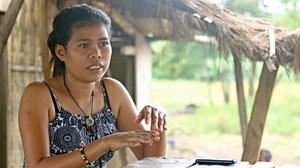
Irene
Anglao talks about the death of her father and the struggle of their community
against encroaching plantations in Bukidnon.
Image credit: Erwin Mascarinas / Global Witness
On 3 February 2017 Renato Anglao, together with his wife and five-year-old son, were travelling home by motorcycle after buying school supplies in Quezon town, Bukidnon. Three unidentified gunmen, on another motorcycle, drew close to the family and shot Renato in the head. He was pronounced dead on arrival at the local hospital. His wife suffered a minor injury and his child was unharmed.
Renato was the Secretary General of the Tribal Indigenous Oppressed Group Association (TINDOGA), which claims rights to some of the ancestral lands of the Manobo Pulanguihon – an indigenous group in the province of Bukidnon, the ‘food basket’ of northern Mindanao. But despite its agricultural riches, Bukidnon is one of the country’s poorest provinces and home to many indigenous groups.
Large swathes of what was once indigenous-owned land in Bukidnon have given way to industrial plantations of sugarcane, pineapples and bananas, exacerbating the impact of historic land disputes that have led to indigenous people being threatened, intimidated and killed. Some such plantations are on indigenous land, which has previously been ‘grabbed’ and is now being used to produce fruit for Del Monte Philippines by a local landowner – a story that unfolds below.
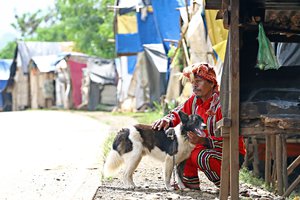
The ancestral lands of the Manobo Pulanguihon
are threatened by plantations used to grow fruit for some of the world's
biggest and best-known brands, Del Monte and Dole.
Image credit: Karlos Manlupig / Global Witness
A modern-day tragedy born of historic land grabs
According to the government’s National Commission on Indigenous Peoples (NCIP), TINDOGA’s ancestral land was borrowed for cattle grazing in 1921 by Bukidnon’s first governor Don ‘Manolo’ Fortich. But when it wasn’t returned after 30 years as promised, it effectively became stolen land. The Fortich clan, of Spanish descent, went on to dominate Bukidnon’s politics and have entire towns named after them.
In 2011, TINDOGA attempted to reclaim its land by building houses on it. By then the land was being used by a company called Montalvan Ranch, even though the company’s permit had expired two years earlier. TINDOGA was driven off the land by armed men at the behest of the Montalvan Ranch. Community representatives told Global Witness that they have since been shot at, received death threats and had 17 of their houses burnt down by gunmen allegedly hired by the head of the company, Pablo Lorenzo III. It would appear no government protection was ever offered to these clearly at-risk indigenous defenders, and the threat was allowed to escalate.
After years of protest camps, rallies and petitioning officials, in 2014 the government finally ruled to return the land to TINDOGA. However, the ruling also included another indigenous organisation that had claims on the land. A year later, that other organisation entered into an agreement to lease part of the land back to Montalvan Ranch. TINDOGA members, claiming the land as theirs, stepped up their protests. On 24 March 2015 – according to one survivor – the company’s guards opened fire on the community while they were on their way to the protest, killing one of their members, Mabini ‘Tata’ Baito, and injuring two more. The NCIP has an office in Bukidnon but failed to resolve the dispute.
TINDOGA suspects that gunmen working for Pablo Lorenzo III were also behind the 2017 killing of Renato Anglao. Lorenzo is the president and chairman of Montalvan Ranchand General Manager and co-owner of the adjacent Kiantig Development Corporation. He is also mayor of Quezon, the town where Renato was killed. Local indigenous leaders allege that, in November 2015, Renato was threatened by Lorenzo in person, who told him: if you don’t stop this you will “regret it”. This came at a time when Renato was leading the community’s protests and just over a year before he was murdered.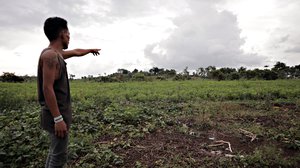
Roy Camanucan, one of the leaders of the
Tindoga points out where one of the attacks against the community took place
perpetrated by the ranch security force.
Image credit: Erwin Mascarinas / Global Witness
Danger signals that Del Monte should have been aware of
The allegations against Pablo Lorenzo III should have been a major red flag for any reputable company. And with a history of land grabs and violence, Bukidnon is a region where extra care should be exercised - and thorough prior and ongoing due diligence done - by companies when establishing agreements with local landowners to grow crops on their behalf, in order to identify and mitigate any historic or new allegations of human rights violations.
However, Global Witness has obtained documents showing that Lorenzo has worked as a consultant for Del Monte Philippines since 2008. What’s more, he is also the general manager and co-owner of the Kiantig Development Corporation – a company that operates on land adjacent to the Montalvan Ranch and which had a Crop Producer and Growership Agreement with Del Monte Philippines to grow pineapples for the corporation from August 2008 until March 2019. Del Monte Philippines continued to do business with Lorenzo even after allegations of violence against indigenous communities which staked claim to his land was made public in national media, as well as via NGO press releases and community protests.
A NCIP resolution found that the land Kiantig operates on, along with the land used by the Montalvan Ranch, was one of four parcels of land stolen from indigenous people by Don Manolo Fortich in 1921. Seven of Kiantig’s current directors have the surname Fortich. In 2016, another indigenous organisation – QUEMTRAS – demanded the cancellation of all contracts held by the government and companies on its land, because it claims that the officials overseeing these contracts were bribed by ‘foreign investors’. It also believes that the community never agreed their land could be used for fruit plantations.
The government itself had already suggested that there was reason for concern. The state body in charge of resolving ancestral land disputes, the NCIP, has backed the legal claims of the indigenous communities to the land held by Lorenzo’s Montalvan and Kiantig companies. In a 2012 resolution, the NCIP also stated that the agreements between the ranchers and the indigenous communities are “fraught with violations especially so that some of these areas are now under lease with big companies for pineapple plantations instead of being utilized for agro-forest purposes”. In November 2016, a government investigation was launched into QUEMTRAS’ claims that ‘foreign investors’ operating on the land were bribing Department for Environment and Natural Resources (DENR) officials overseeing the lease agreements. Global Witness is unaware of who these investors might be. In a letter to Global Witness, Del Monte Philippines said that they are “not aware of any such bribery” and “did not deal with the DENR with respect to the [Kiantig] land”.
Global Witness wrote to Del Monte Philippines, which claimed it had checked that Kiantig did have the correct permissions to allow growership agreements for agricultural plantations on the land before they entered into their arrangement; something which the community disputes.
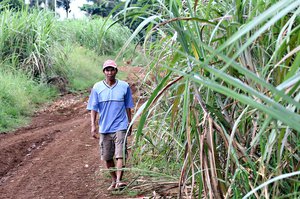
The ancestral lands of the Manobo Pulanguihon
are threatened by plantations used to grow fruit for some of the world's
biggest and best-known brands, Del Monte and Dole.
Image
credit: Karlos Manlupig / Global Witness
Del Monte Philippines' due diligence prior to entering into a growership agreement with Kiantig should have raised serious questions about historical disputes regarding indigenous rights to the land in question. However, Del Monte Philippines told Global Witness that they “do not have knowledge of the alleged historical dispute about the [Kiantig] land”.
Ongoing due diligence should have alerted the company to allegations of violence associated with their consultant and Kiantig head Pablo Lorenzo. However, Del Monte Philippines told Global Witness that they do “not have knowledge of the serious allegations” and “did not know about” Renato Anglao’s murder. They state that they “had no factual or legal basis to terminate our growership agreement” with Kiantig, and that they “had decided not to renew [Lorenzo’s] consultancy when we learned that he held public office”. The company told Global Witness that “We are certain that if the [violent] incident[s] and allegation [that Pablo Lorenzo was associated with Renato’s murder] were brought to our company’s attention, we would have investigated the same and taken any necessary steps”.
Del Monte Philippines confirmed that it sells tinned pineapples to Del Monte Foods in the US. However, the Filipino company insists none of the tinned pineapples that came from Kiantig ranch made their way to the US. Del Monte Foods confirmed all its pineapples are from the Philippines and said it sourced them from the port town of Bugo. Bugo is about 90km from the Kiantig plantation. Regardless of where the Bukidnon fruit ended up, the fact remains that the US firm is doing business with Del Monte Philippines, a local company operating in a dangerous environment, employing a local grower tainted by serious accusations, and buying fruit grown on disputed indigenous land, the claimants to which have been attacked and even murdered. Del Monte Foods has a responsibility to ensure that its suppliers uphold human rights and environmental standards, and should investigate any accusations of illegalities, wrongdoing or inadequate due diligence associated with their suppliers’ operations.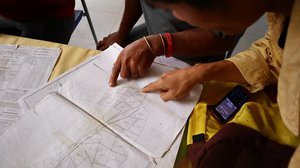
KADIMADC indigenous peoples group of the Higanonon
tribe shows the map of their ancestral domain claim that has been allegedly
occupied by the De Leon Ranch for the DOLE banana plantation in Impasug-ong
town, Bukidnon province.
Image
credit: Erwin Mascarinas / Global Witness
The NCIP’s mixed and inadequate response
The indigenous groups of QUEMTRAS, TINDOGA and indeed KADIMADT (an indigenous group which has been threatened and attacked for protesting against a questionable sub-lease deal with Dole on its land) have raised concerns about the use of their land and the violence perpetrated against them. That the NCIP took years to respond adequately to the communities’ complaints and its own misgivings about the contracts on the ancestral land, raises serious questions about the Commission’s ability to stand up to powerful business interests.
Kiantig Development Corporation’s Forest and Land Grazing Lease Agreement, issued by the Department of Environment and Natural Resources on ancestral land, expired in December 2018. Yet it continued to use the land to grow pineapples for Del Monte Philipines for a further three months, arguing this was necessary to purchase the remaining fruits to be harvested by that time. In February 2019, some governmental institutions finally stepped in to do their job, helping 480 families from the indigenous Manobo community assert their rights and begin the process of reclaiming their ancestral land from ranchers. Accompanied by military officials and the Philippines National Police, an NCIP-led taskforce went with the community to deliver an eviction notice to Kiantig.
Global Witness asked Del Monte Philippines to explain what actions they had taken to ensure that the indigenous community were fully informed of and agreed to the extension of their growership agreement with Kiantig into 2019. Their response was that “our Company did not know who these claimants were and who exactly to inform. The indigenous community did not communicate with us regarding its supposed claim on the area.”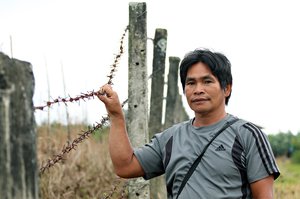
Benedict Kilaan, chairperson of the KADIMADC indigenous
peoples group, holds a portion of the barbwire fence that claims part of the
ancestral land in the village of La Furtona, Impasug-ong town, Bukidnon
province.
Image
credit: Erwin Mascarinas / Global Witness
The case for change
It is Global Witness’s view that local ranchers operating on disputed land are willing to allow violence and intimidation to be used, in order to retain control of the land and lucrative contracts with overseas investors. They demonstrate that the Philippines government is still failing to resolve land disputes, guarantee indigenous rights or protect defenders.
But in particular, they suggest that Del Monte Philippines has acted recklessly and irresponsibly in continuing to do business with Pablo Lorenzo – both as a consultant and as a grower of their pineapples – after he and his private security guards were subject to serious allegations of land grabs and violence against community members and indigenous defenders, including Renato Anglao, who was later murdered.
The company should have spotted the evidence of land disputes and allegations of violence linked to its business partner and supplier. Given the complaints of the local indigenous communities, the region’s history of land grabs and violence, and the well-documented criticisms of the government’s institutions and processes designed to uphold indigenous rights in the country. The government should have made extra efforts to guarantee their safety and their rights, as required by international and Filipino law.
Global Witness believes that Del Monte Philippines’ response to our enquiries is emblematic of an inadequate approach to due diligence. Their admission that they were unaware of the claimants to the Kiantig land, the complaints of historic land grabs and of local violence – and their excuse that the indigenous groups affected failed to contact Del Monte - misses the point that it is incumbent upon the company to act responsibly, identify potential human rights violations and take steps to mitigate them. This responsibility becomes accentuated when operating in a country and a region where government institutions are routinely accused of failing to protect rights and uphold the law, and where the ability of communities to speak out and approach companies is undermined by precisely the kinds of threats and attacks which Del Monte Philippines ought to have been aware of.
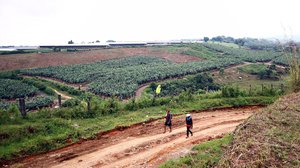
Rosendo
Lumalan and Norven Yambon on their small portion of farm land.
Image credit: Erwin Mascarinas / Global Witness
Del Monte Philippines’ failure to terminate or carefully review its contracts with Pablo Lorenzo before 2019 raises serious questions about the company’s commitment to respecting the rights of local indigenous communities. Given the importance of the company in Bukidnon, this raises the prospect that similar problems may exist across the region and strengthens the case for a full review of the company’s operations there. This should ensure that its business partners and suppliers are not involved in violent disputes with local communities, and that peaceful and respectful resolutions are sought which protect the rights of any community potentially affected by its operations.
Foreign buyers of fruit from Del Monte Philippines and similar companies, like the US-based Del Monte Foods, also have a responsibility to ensure that their suppliers uphold human rights and environmental standards in their supply chains. Whilst Del Monte Foods boasts of its cosy relationships with family farms in the US, there are clear questions to be answered regarding apparent inadequacies in Del Monte Philippines’due diligence, and what that means in terms of the company’s association with human rights abuses against indigenous people and attacks against land and environmental defenders.
Recent government support for families displaced by Kiantig Development Corporation is cause for hope, but it came too late to prevent years of conflict. The perpetrators of this violence remain free, leaving TINDOGA and QUEMTRAS vulnerable to further attacks.
President Duterte has promised to tackle the abuse of indigenous peoples by big business and powerful landowners, but has so far done little to live up to that promise. A radical change in priorities is necessary in the second half of his term in office.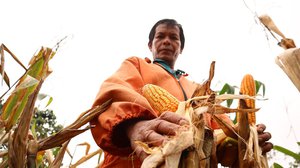
Arthur Sanduan harvests corn along their small community farm in the village of La Furtona, Impasug-ong town, Bukidnon province.
Image credit: Erwin Mascarinas / Global WitnessGiven these findings, Global Witness recommends that:
- The Philippines government guarantees the security of all members of TINDOGA and QUEMTRAS, and that the perpetrators of Renato Anglao’s murder, as well as those behind it, are prosecuted.
- The Philippines government guarantees an independent investigation into the alleged illegalities involving these ranches, as well as into the role of Mayor Pablo Lorenzo in alleged land grabs and threats against defenders, ensuring the victims receive compensation and redress.
- Del Monte Philippines conducts a full review of its existing and planned business partners and suppliers, to ensure that any potential human rights violations and land disputes are identified, avoided and mitigated.
- Any agribusiness companies planning operations in Bukidnon conduct thorough and ongoing due diligence into their operations, business partners and suppliers to identify, avoid and mitigate potential human rights violations and environmental harm.
- Del Monte Foods (US) and other companies sourcing fruit from the Philippines ensure that the companies they buy from adhere to international law and best practice, and are not associated with human rights abuses.
In July 2019, Global Witness exposed how the operations of global food giant Dole Philippines in Bukidnon show how demand for products we consume every day is driving violations against indigenous peoples and their leaders in the Philippines. Find out more about this on page 20 of our report Enemies of the State?
Find out more
You might also like
-
Report Enemies of the State?
More than three people were murdered each week in 2018, with countless more criminalised, for defending their land and our environment.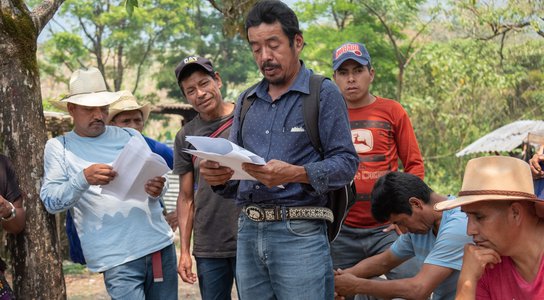
-
Briefing What Businesses & Governments can do for Defenders
Governments, companies and investors can play an important role in supporting defenders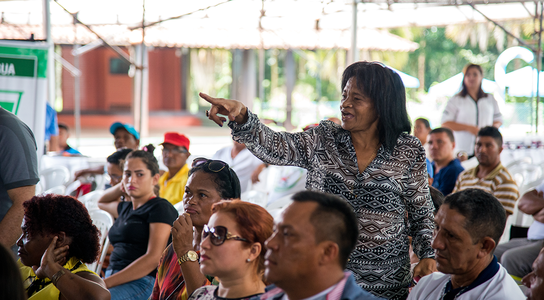
-
Press release Revealed: Del Monte Philippines' growers implicated in violent attacks against indigenous activists as attacks against land and environmental defenders escalate
Del Monte Philippines and their pineapple grower - suspected of ordering alleged attacks on indigenous activists.